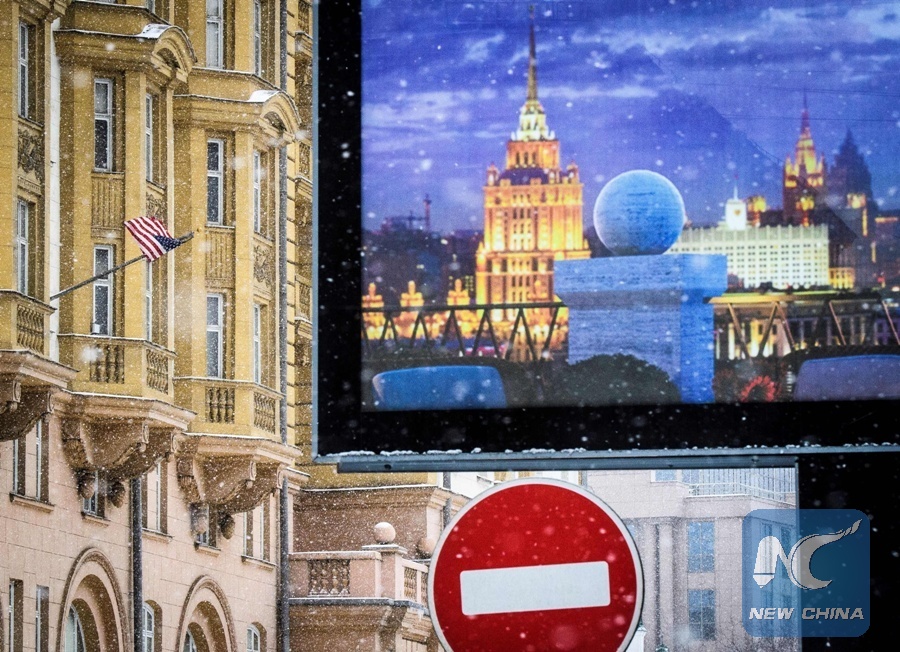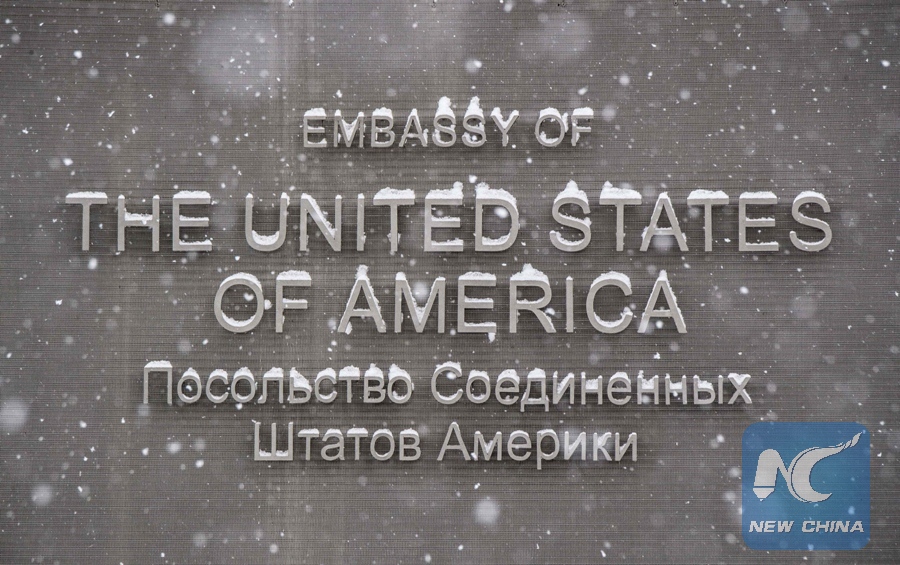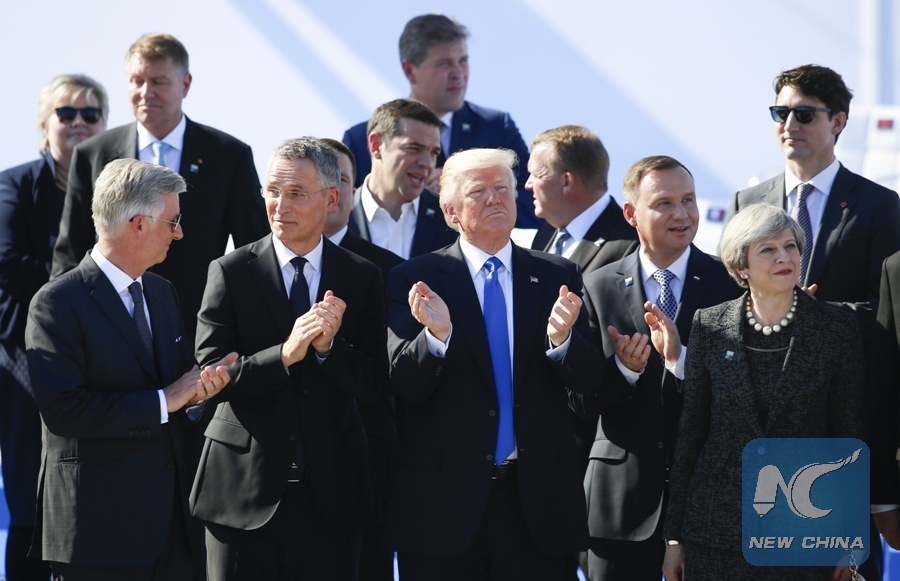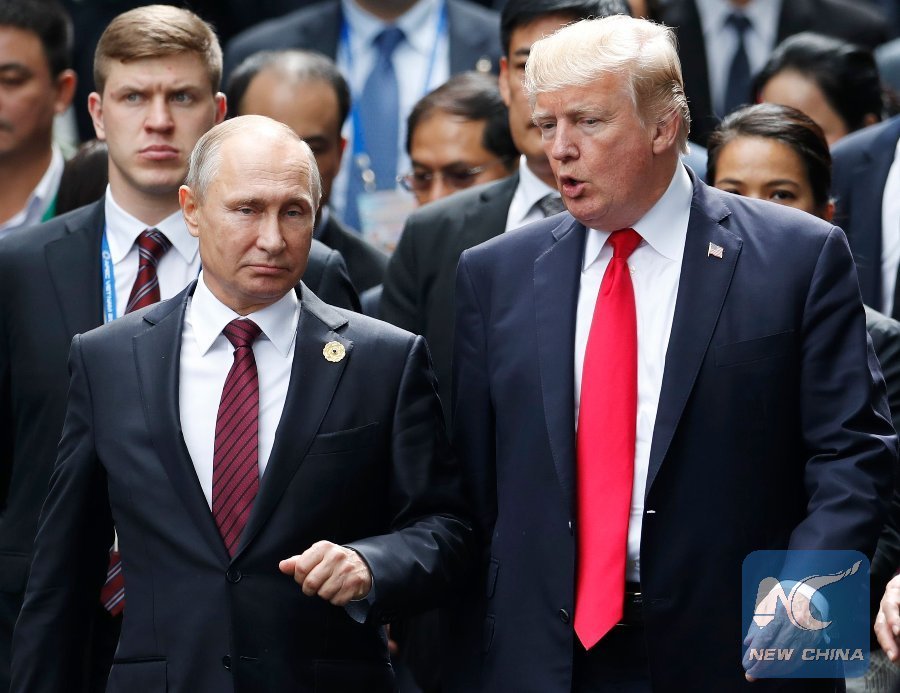
The United States flag flies on the U.S. embassy building in Moscow on March 27, 2018. (Xinhua/AFP)
WASHINGTON, March 29 (Xinhua) -- The United States lashed out Thursday at Russia's expulsion of U.S. diplomats and warned further "retaliation," triggering worries that the escalating diplomatic confrontation between the West and Russia may slide out of control.
RECIPROCAL EXPULSION
The Russian Foreign Ministry announced Thursday the expulsion of 60 U.S. diplomats and shut U.S. consulate in St. Petersburg in retaliation for Washington's moves against Moscow over an ex-spy poisoning incident, urging U.S. authorities to rethink and stop "reckless" actions that hurt bilateral relations.

Photo taken on March 27, 2018 shows the sign outside the United States embassy in Moscow. (Xinhua/AFP)
The move came on the heels of U.S. President Donald Trump's order on Monday to expel 60 Russian diplomats and intelligence officials in the United States to protest and counter Russia's accused involvement in the poisoning attack.
Former Russian double agent Sergei Skripal and his daughter Yulia were found unconscious on a bench at a shopping center in the British city of Salisbury on March 4.
Claiming the pair was exposed to a nerve agent, Britain, the United States and many of their allies hold Russia responsible, while Moscow has denied any involvement in it and demanded solid evidence.
U.S. CRITICISM
In an announcement issued later Thursday, the White House said Russia's expulsion "marks a further deterioration" in the U.S.-Russia relationship.
"Russia's response was not unanticipated, and the United States will deal with it," said the White House.
The U.S. State Department noted that Russia's decision was "regrettable" and "unwarranted."
There is "no justification" for Russia's expulsion decision, and by doing this Moscow will further isolate itself economically and diplomatically, said State Department spokesperson Heather Nauert in a press release.
She added that the United States is reviewing the details of the Russian action and reserves the right to respond "accordingly."

King Philippe of Belgium, NATO Secretary General Jens Stoltenberg, U.S. President Donald Trump, British Prime Minister Theresa May (from L to R, front) and other NATO member states leaders watch air show at the handover ceremony of the new NATO headquarters during a one-day NATO Summit, in Brussels, Belgium, May 25, 2017. (Xinhua/Ye Pingfan)
Nauert said 28 countries and the North Atlantic Treaty Organization have joined the United States to expel 153 Russian officials in total.
DOOR OPEN
The Trump administration's attitude on the poisoning attack has been ambiguous, as Trump has so far kept from launching direct verbal attack against Moscow. Last week, he made a call to Russian President Vladimir Putin to congratulate him on his re-election and offered to meet in the near future, despite strong opposition of senior national security advisors.

In this file photo taken on Nov. 11, 2017, U.S. President Donald Trump (R) and Russian President Vladimir Putin talk as they make their way to take the "family photo" during the Asia-Pacific Economic Cooperation (APEC) leaders' summit in the central Vietnamese city of Danang. (Xinhua/AFP)
What also stood in stark contrast to the administration's scathing statements and mounting sanctions were the White House's repeated calls to engage with Russia on key international issues, ignoring calls from across the Atlantic Ocean to speak and act more harshly after the poison attack.
On Thursday morning, senior administration officials, on condition of anonymity, told the media before Russia's announcement that the "door is open" for the United States to accept Russian diplomats after the expulsion.
"Here in the United States, from the president on down, we've all expressed a hope for better relations between our countries," the officials said.
"TURNING POINT"
Experts said that underneath the moves were the West's deep-seated mistrust with Moscow, which was further escalated by Russia's alleged intervention in the 2016 U.S. elections, its moves in Ukraine and Crimea and the spy poisoning incident.
Dan Mahaffee, senior vice president and director of policy at the Center for the Study of the Presidency and Congress, told Xinhua that the U.S. moves "are far more than symbolic."
William Courtney, adjunct senior fellow of global policy think tank Rand Corporation, said the West-Russia relations will become more strained, but the West is willing to run this risk.
"Channels for Western dialogue with Russia may exist, but are of little value unless progress can be made on key issues," he said.
Given the fact that the odds are high that Russia will not change course to reapproach the West, the U.S. administration officials said the poisoning incident "may very well represent a turning point in how we view Russian activities" in the West.
After the U.S. expulsion of Russian officials, U.S. Defense Secretary James Mattis in a press briefing on Tuesday said the previous cooperation mechanism between the two militaries have been frozen.
(Matthew Rusling from Washington also contributed to the story.)

